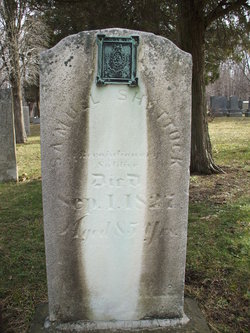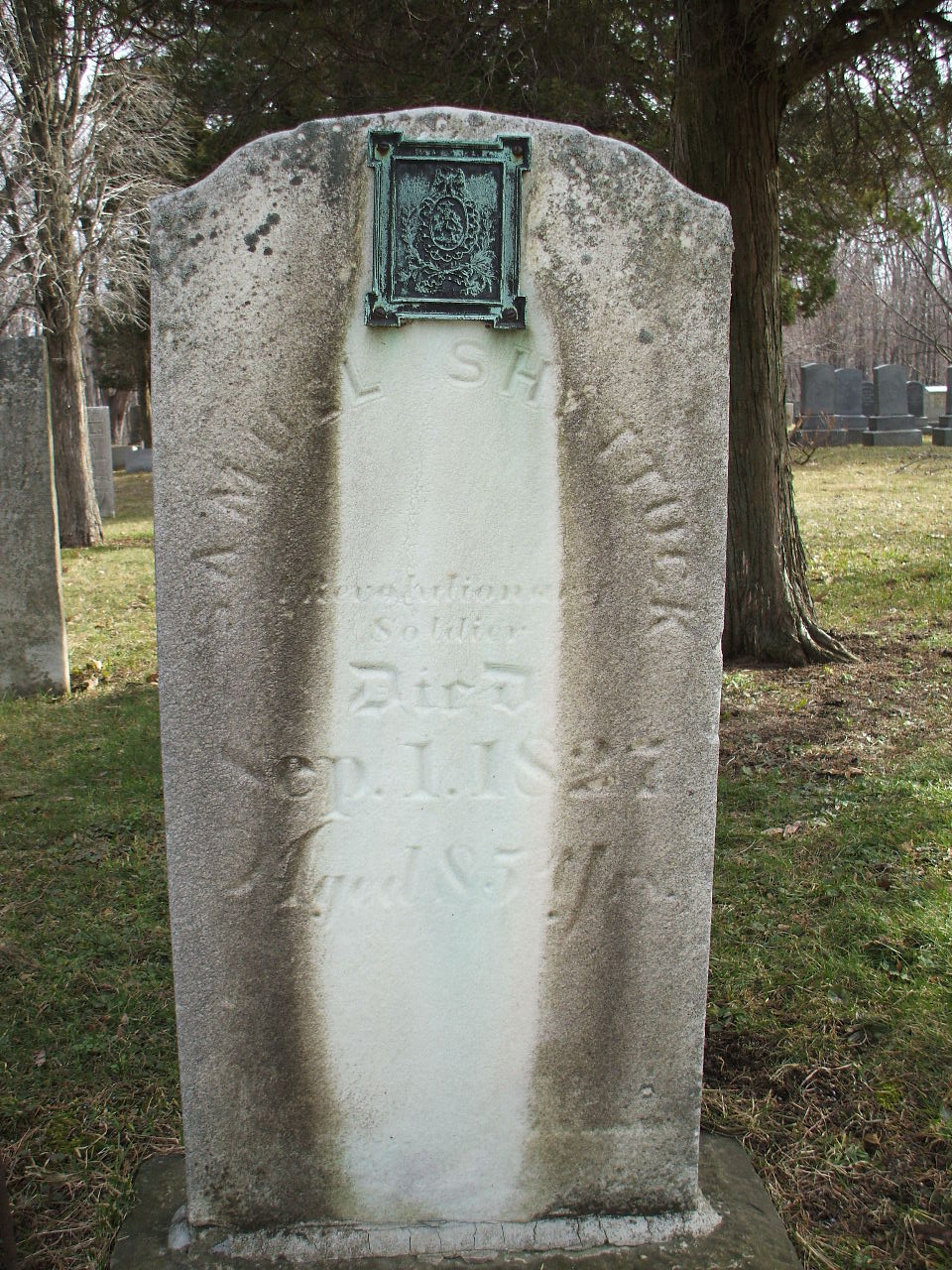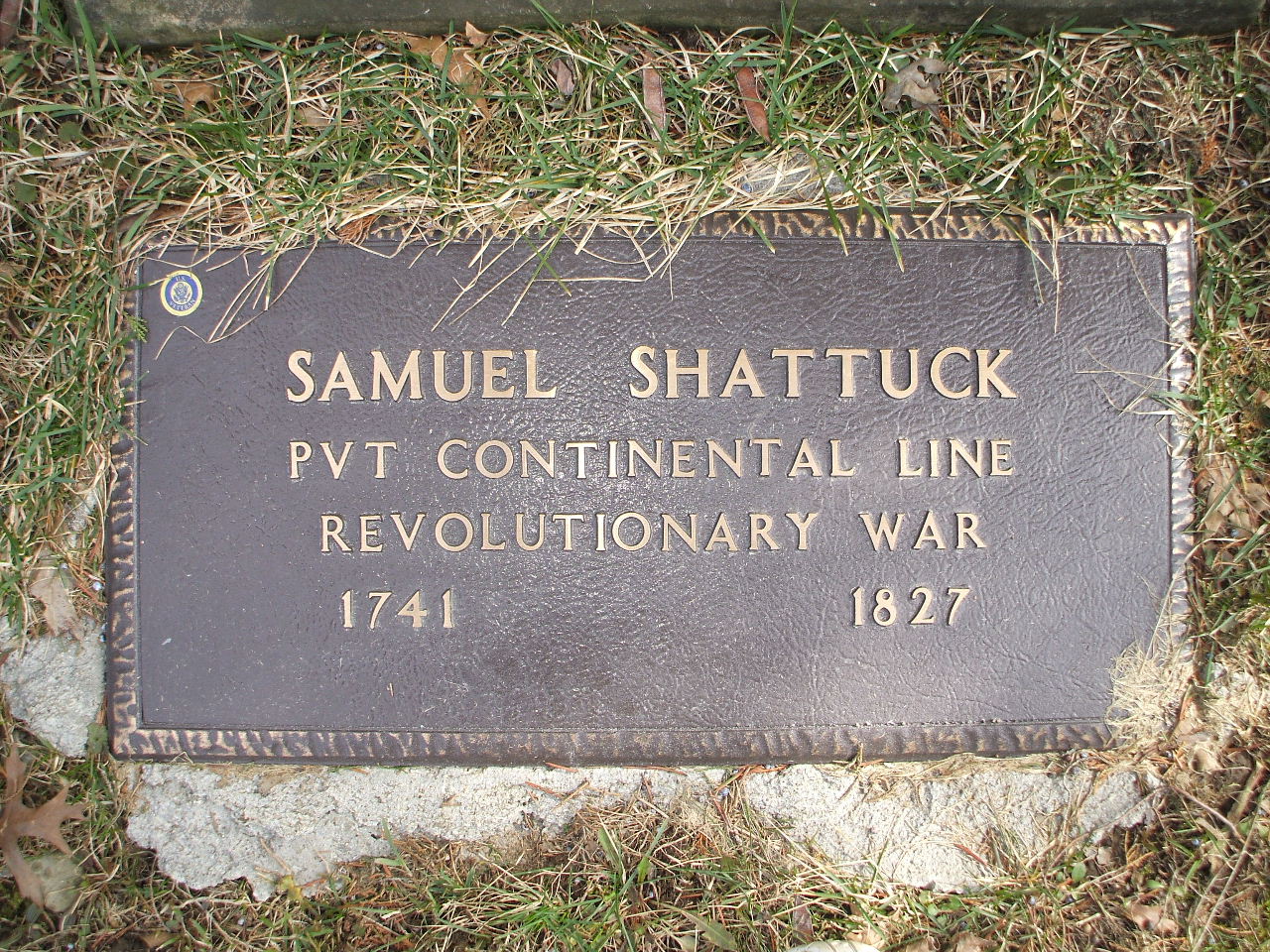Was at Bunker Hill, Bennington, Yorktown.
HISTORICAL SKETCHES of the TOWN OF PORTLAND
BY H.C. TAYLOR, M.D. Published 1873
and other printed sources below
SHATTUCK, Samuel
Was the grandfather of Loren and Isaac Shattuck, formerly citizens of the town of P. He was b. in the town of Deerfield, Franklin County, Mass., Sept. 18, 1741. He m. Chloe Field, dau. of Aaron Filed, whose father, Ebenezer, was killed by the Indians in 1708. Mrs. S. d. Greenfield, Mass., April 10, 1781. Mr. S. was a soldier in the old French and Indian war when he was but a mere lad; was through the Revolutionary war, and participated in the battles of Bunker Hill, Bennington, Yorktown, and many others. He removed to P. in Nov., 1823, and lived with his son Seth until his d., Sept. 1, 1827. He was bu. in Evergreen cemetery.
Family of Mr. and Mrs. Shattuck -
SAMUEL: b. Aug. 15, 1764; m. Prudence Healey.
CHLOE: b. Nov. 22, 1766; m. Ephraim Leech.
SIDNEY: b. Feb. 7, 1768; m. Ann Atherton.
SETH: b. Jan 24, 1770; m. 1st, S. Chapin; 2d Anna Smith.
LYDIA: b. Feb. 15, 1778; m. Arad Root.
JESSE: b. Sept. 21, 1777; m. Mary E. Sargent.
CHESTER: b. Dec. 17, 1780; m. Miriam Stoker,
All born in Greenfield, Mass.
As stated above, Mr. S. was in the French war of 1754, and two years earlier, although a youth, was in some capacity attached to the service at some point on the northern border of this state. In the Fredonia Censor of February 22, 1871, appeared a communication from the pen of Hon. E. T. Foote of New haven, Conn., formerly of this county, with reference to early military operations in the western portion of this county. Judge Foote says: " It has been generally conceded that a portage road from the head of Chautauqua to lake Erie had been opened before the settlement of this county, but by whom and when, it was opened has remained until recently an open question." This matter so long a mystery, through the untiring industry and restless research of Judge Foote, has been pretty definitely settled by the production from some old historical records of an affidavit of Stephen Coffin, an American from New England, taken before Sir William Johnson in January, 1754. Coffin, according to this affidavit, had been taken prisoner by the French and Indians in 1747, and after four years of wanderings was taken to Quebec, Canada. From here he made an effort to escape but was recaptured in 1752, and after lying in prison three months was induced to enlist in the French service, and was one of 300 men sent to Montreal and from there to Niagara, by land and on the ice, for the purpose of inaugurating an effort to establish a chain of forts between Canada and New Orleans. In April of 1753 they proceeded in boats from some point above Niagara Falls to Chadakoin, where they had been ordered to build a fort preparatory to building a portage road to lake Chadakoin (Chautauqua), where another fort was to be built. This route was for a time abandoned for one from Fort la Briske, now Erie, Pa. to the LaBoeuf river, 21 miles south; a return was ordered by the Governor of Canada to Chadakoin. In October a party of 200 men cut a wagon road from lake Erie at the mouth of Chadakoin creek, now Chautauqua creek, a t Barcelona, over the carrying place to lake Chadakoin, or Chautauqua lake. Coffin was of this party, and on the return to Niagara in Nov. deserted in company with a Frenchman to some point in the interior of New York. The portage road was not only cut through, but the steep banks along the streams were graded or to some extent broken down to allow of the passing of loaded wagons. Some remains of this road near Westfield are still to be seen. The English, ever suspicious and watchful of the movements of the French, sent out several scouting parties from some point on the south border of the state, probably Oswego, for the purpose of obtaining reliable information in regard to those efforts and taking measures to counteract them. Thus it will be seen that 120 years ago a systematic effort was made to establish a great military thoroughfare through our county, and a large portion of the way through the territory included in the old town of Portland. Two of the scouting parties at least passed through the present town of P., lay in ambush and watched the labors of the French from day to day until the information sought was obtained, when they returned. Mr. Shattuck, then a stripling occumpanied (sic) these parties on two separate occasions, and probably was one of the first whites setting foot in the present town, then of course an unbroken wilderness, little dreaming that in some of the years to come he would become a citizen of that same region and a dweller upon a pleasant farm wrought out of the same wilderness by the strong arms of a son and grandsons. Mr. S. often related the incidents of these expeditions, and there are those now living in town who well remember Mr. S. and vouch for his integrity. He remained in the service until 1755 when he returned to his native town.
Thus another proof is furnished, in addition to that furnished by Judge Foote, of the authors of the old portage road and of the time when it was made. The letter of Judge Foote, the deposition of Coffin and the facts furnished by Mr. Shattuck thus brought to light "are of great local interest and go far to show that our county, although then a deep solitude, far distant from the most advanced outposts of permanent settlements, was more often the scene of warlike demonstrations than it has since been; that in the early day martial sounds were often heard in the depths of its forests; fleets of boats filled with armed and veteran Frenchmen passed along our lakes and creeks; and that such gallant men as Beaujeu, who led the handful of Frenchmen at Braddock's defeat, St. Pierre, :a Force. And Joneaire, names that are now famous in history, were once familiar with these wild regions, and that the warpath of veritable savage warriors, armed with tomahawk and scalping-knife, led through these forests." - Obed Edson. Mr. Shattuck was "through the Revolution." As at first stated, and for a portion of the time "belonged to the first regiment and first brigade of the Massachusetts line," and through participating in many a sanguinary conflict was "never grazed by a ball," though several passed through his clothes and hat.
Additional information provided by Dolores Davidson
Was at Bunker Hill, Bennington, Yorktown.
HISTORICAL SKETCHES of the TOWN OF PORTLAND
BY H.C. TAYLOR, M.D. Published 1873
and other printed sources below
SHATTUCK, Samuel
Was the grandfather of Loren and Isaac Shattuck, formerly citizens of the town of P. He was b. in the town of Deerfield, Franklin County, Mass., Sept. 18, 1741. He m. Chloe Field, dau. of Aaron Filed, whose father, Ebenezer, was killed by the Indians in 1708. Mrs. S. d. Greenfield, Mass., April 10, 1781. Mr. S. was a soldier in the old French and Indian war when he was but a mere lad; was through the Revolutionary war, and participated in the battles of Bunker Hill, Bennington, Yorktown, and many others. He removed to P. in Nov., 1823, and lived with his son Seth until his d., Sept. 1, 1827. He was bu. in Evergreen cemetery.
Family of Mr. and Mrs. Shattuck -
SAMUEL: b. Aug. 15, 1764; m. Prudence Healey.
CHLOE: b. Nov. 22, 1766; m. Ephraim Leech.
SIDNEY: b. Feb. 7, 1768; m. Ann Atherton.
SETH: b. Jan 24, 1770; m. 1st, S. Chapin; 2d Anna Smith.
LYDIA: b. Feb. 15, 1778; m. Arad Root.
JESSE: b. Sept. 21, 1777; m. Mary E. Sargent.
CHESTER: b. Dec. 17, 1780; m. Miriam Stoker,
All born in Greenfield, Mass.
As stated above, Mr. S. was in the French war of 1754, and two years earlier, although a youth, was in some capacity attached to the service at some point on the northern border of this state. In the Fredonia Censor of February 22, 1871, appeared a communication from the pen of Hon. E. T. Foote of New haven, Conn., formerly of this county, with reference to early military operations in the western portion of this county. Judge Foote says: " It has been generally conceded that a portage road from the head of Chautauqua to lake Erie had been opened before the settlement of this county, but by whom and when, it was opened has remained until recently an open question." This matter so long a mystery, through the untiring industry and restless research of Judge Foote, has been pretty definitely settled by the production from some old historical records of an affidavit of Stephen Coffin, an American from New England, taken before Sir William Johnson in January, 1754. Coffin, according to this affidavit, had been taken prisoner by the French and Indians in 1747, and after four years of wanderings was taken to Quebec, Canada. From here he made an effort to escape but was recaptured in 1752, and after lying in prison three months was induced to enlist in the French service, and was one of 300 men sent to Montreal and from there to Niagara, by land and on the ice, for the purpose of inaugurating an effort to establish a chain of forts between Canada and New Orleans. In April of 1753 they proceeded in boats from some point above Niagara Falls to Chadakoin, where they had been ordered to build a fort preparatory to building a portage road to lake Chadakoin (Chautauqua), where another fort was to be built. This route was for a time abandoned for one from Fort la Briske, now Erie, Pa. to the LaBoeuf river, 21 miles south; a return was ordered by the Governor of Canada to Chadakoin. In October a party of 200 men cut a wagon road from lake Erie at the mouth of Chadakoin creek, now Chautauqua creek, a t Barcelona, over the carrying place to lake Chadakoin, or Chautauqua lake. Coffin was of this party, and on the return to Niagara in Nov. deserted in company with a Frenchman to some point in the interior of New York. The portage road was not only cut through, but the steep banks along the streams were graded or to some extent broken down to allow of the passing of loaded wagons. Some remains of this road near Westfield are still to be seen. The English, ever suspicious and watchful of the movements of the French, sent out several scouting parties from some point on the south border of the state, probably Oswego, for the purpose of obtaining reliable information in regard to those efforts and taking measures to counteract them. Thus it will be seen that 120 years ago a systematic effort was made to establish a great military thoroughfare through our county, and a large portion of the way through the territory included in the old town of Portland. Two of the scouting parties at least passed through the present town of P., lay in ambush and watched the labors of the French from day to day until the information sought was obtained, when they returned. Mr. Shattuck, then a stripling occumpanied (sic) these parties on two separate occasions, and probably was one of the first whites setting foot in the present town, then of course an unbroken wilderness, little dreaming that in some of the years to come he would become a citizen of that same region and a dweller upon a pleasant farm wrought out of the same wilderness by the strong arms of a son and grandsons. Mr. S. often related the incidents of these expeditions, and there are those now living in town who well remember Mr. S. and vouch for his integrity. He remained in the service until 1755 when he returned to his native town.
Thus another proof is furnished, in addition to that furnished by Judge Foote, of the authors of the old portage road and of the time when it was made. The letter of Judge Foote, the deposition of Coffin and the facts furnished by Mr. Shattuck thus brought to light "are of great local interest and go far to show that our county, although then a deep solitude, far distant from the most advanced outposts of permanent settlements, was more often the scene of warlike demonstrations than it has since been; that in the early day martial sounds were often heard in the depths of its forests; fleets of boats filled with armed and veteran Frenchmen passed along our lakes and creeks; and that such gallant men as Beaujeu, who led the handful of Frenchmen at Braddock's defeat, St. Pierre, :a Force. And Joneaire, names that are now famous in history, were once familiar with these wild regions, and that the warpath of veritable savage warriors, armed with tomahawk and scalping-knife, led through these forests." - Obed Edson. Mr. Shattuck was "through the Revolution." As at first stated, and for a portion of the time "belonged to the first regiment and first brigade of the Massachusetts line," and through participating in many a sanguinary conflict was "never grazed by a ball," though several passed through his clothes and hat.
Additional information provided by Dolores Davidson
Family Members
Advertisement
Explore more
Sponsored by Ancestry
Advertisement











